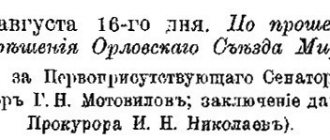Sections are devoted to petitions and complaints. V of the Code of Criminal Procedure, which regulates the main provisions of these forms of appeal by individuals and legal entities - participants in legal proceedings to officials conducting legal proceedings at the pre-trial stages, and to the court. In subsequent sections of the Code of Criminal Procedure, the specifics of the procedure for filing petitions and complaints and their resolution are regulated in relation to each stage of legal proceedings. The allocation in the Code of Criminal Procedure of a special section regulating the general rules of petitions and complaints is due to the significance of these forms of appeal by participants in the process, primarily citizens, to officials and the court, as a guarantee of the protection of their rights and legitimate interests.
Petition
A petition is a form of appeal by persons conducting pre-trial proceedings to the court in cases where a decision limiting the rights and freedoms of citizens can only be made by the court (Part 2 of Article 29 of the Code of Criminal Procedure).
Petition - an official request from a participant in legal proceedings addressed to the inquirer, investigator, or court,
- on the performance of procedural actions or adoption of procedural decisions to establish circumstances relevant to the criminal case, ensure the rights and legitimate interests of the persons who filed the petition, or the person or organization represented by them;
- on establishing the procedural status of the applicant (for example, on recognition as a victim, civil plaintiff, etc.);
- about the progress of the case (for example, about sending the case to court, about terminating criminal prosecution, or changing the scope of the charge);
- on consideration of the case by a jury or in a special trial procedure.
Persons entitled to apply:
- suspect, accused, his defense attorney;
- private prosecutor;
- expert;
- civil plaintiff, civil defendant, their representatives;
- representative of the organization's administration;
- another person
the victim, his legal representative and representative;
whose rights and legitimate interests are affected during pre-trial or judicial proceedings.
The public prosecutor also has the right to file a motion during the trial.
The right of each participant in legal proceedings to submit petitions is specified in the relevant article of the Code of Criminal Procedure, which regulates the procedural position of a particular participant (see, for example, Articles 46, 47, 54 of the Code of Criminal Procedure).
The petition may be filed at any time during the criminal proceedings. Rejection of the application does not deprive the applicant of the right to re-submit the application.
A written petition is attached to the criminal case, an oral petition is entered into the protocol of the investigative action or court session.
The petition is subject to consideration and resolution immediately after its application. In cases where an immediate decision on a petition submitted during the preliminary investigation is impossible, it must be resolved no later than 3 days from the date of its application (Article 121 of the Code of Criminal Procedure of the Russian Federation).
The following are permitted immediately after their application and discussion:
- petitions received before the start of the consideration of the case or stated in the preparatory part of the court session:
- about calling new witnesses, experts, specialists;
- on the demand for material evidence and documents or on the exclusion of evidence obtained in violation of the requirements of the criminal procedure law;
- petitions related to determining the circle of participants in the trial and the progress of the case (for recognition as a victim, a civil plaintiff, for postponing or suspending the trial, dismissal of the case, etc.).
In the absence of sufficient data necessary to resolve the petition in this part of the trial, the judge has the right to invite the parties to submit additional materials in support of the stated petition and assist them in obtaining such materials, as well as take other measures to make a lawful and informed decision provided for in Part 1. .2 tbsp. 271 Code of Criminal Procedure of the Russian Federation.
The approval of the petition or the complete or partial refusal to satisfy it is made by:
- inquiry officer, investigator, judge - resolution;
- court - determination,
which is brought to the attention of the person filing the application. The decision on the petition may be appealed in the manner prescribed by Chapter 16 of the Code.
More details
Participants in legal proceedings on the part of the prosecution and on the part of the defense have the right to file a petition for the performance of procedural actions and the adoption of procedural decisions (for example, the accused petitions for the interrogation of a person indicated by him as a witness, the defense lawyer for the inclusion of a document presented by him in the case, the civil plaintiff asks for a decision on seizing the property of the accused to secure a civil claim, etc.).
The expert has the right to petition for the provision of additional materials necessary for giving an opinion, or for the involvement of other experts in the forensic examination (Clause 2, Part 3, Article 57 of the Code of Criminal Procedure).
Clarification of the right to submit petitions and ensuring this right are the responsibility of the inquirer, investigator, prosecutor and court (see, for example, Part 5 of Article 172 of the Code of Criminal Procedure). Subjects of the right to submit motions must be explained that a motion can be filed at any time during the proceedings. Rejection of a petition does not deprive the applicant of the right to re-file the petition both within one stage and in subsequent stages of the proceedings.
A request to carry out investigative actions to collect evidence must be granted if the circumstances for which the applicant seeks to establish may be important to the case. The question of whether the circumstances that one or another participant in the proceedings seeks to establish may be important for the case is decided by the inquirer, investigator, head of the investigative body, prosecutor, judge, court.
A motion submitted at a preliminary hearing or a court hearing must be considered and a decision made on it immediately after its application. The applicant must receive a response as to whether his application is granted or rejected, which gives him the right to re-apply the application within the proceedings at one stage, or at a subsequent stage. So, for example, if the accused or his defense attorney petitioned the court to summon and question a witness they had named, the court should not delay making a decision on the petition until the previously summoned witnesses are questioned. The court, having discussed the petition, must give the applicant a response on the merits of the stated petition. For example, the court may reject the stated petition, which does not deprive the applicant of the right to again appeal to the court with the same request, and the court, taking into account new data obtained during the judicial investigation, may satisfy the previously rejected petition. So, for example, in Part 7 of Art. 235 of the Code of Criminal Procedure states that when considering a criminal case on the merits, the court, at the request of a party, has the right to reconsider the issue of recognizing excluded evidence as admissible.
The request may be:
- satisfied or
- rejected (in whole or in part).
In case of complete or partial refusal of the application, a decision must be made by the inquirer, investigator, judge, or a court ruling indicating the reasons for the refusal.
The person who submitted the application must be notified of the results of the consideration of the application. In case of complete or partial refusal to satisfy the application, the applicant must be sent a written decision on the submitted application indicating the reasons for the refusal. The Constitutional Court of the Russian Federation drew attention to the inadmissibility of unmotivated refusals to satisfy the requests of participants in criminal proceedings (See. ruling of the Constitutional Court of January 25, 2005 No. 42-0 in the case of violations of constitutional rights and freedoms by the provisions of Art. 7 and 123, part 3 art. 124, art. 125, 388 and 408 of the Code of Criminal Procedure of the Russian Federation). The decision made on the petition may be appealed.
Decisions to satisfy or reject petitions of participants in the trial (for example, to refuse a petition to order a re-examination) are subject to appeal not at the time the court makes a decision on the petition, but together with the verdict (decision) (Article 389.2 of the Code of Criminal Procedure). This rule is based on the fact that a court decision to grant or reject a petition is not final and does not deprive a party of the right to re-file a petition at the same court hearing.
This approach is consistent with the legal position of the Constitutional Court of the Russian Federation, according to which, in order to ensure the independence of the court, verification of the legality and validity of the so-called interim court decisions, including those made on requests for the study of evidence submitted at the court hearing, can be carried out only after the completion of the proceedings in the court of the first authorities simultaneously and in connection with the verdict.
Sample request to postpone a court hearing
Drawed up when it is impossible to ensure attendance at a court hearing. The reasons must be valid, in accordance with Art. 167 Code of Civil Procedure of the Russian Federation. The party must also provide evidence that the circumstances preventing attendance at the court hearing were valid. The court has the right to refuse to satisfy the petition. The time of the next hearing is determined by the judge taking into account his own employment, the wishes of the parties are taken into account.
According to judicial practice, the following reasons are accepted as valid:
- health status;
- actual impossibility of presence (business trip, departure);
- participation in another court hearing (for legal entities only if it is impossible to ensure the presence of another representative), etc.
Example of a completed document:
Complaint
A complaint is an appeal to an official conducting legal proceedings or to a court regarding a violation of the rights and legitimate interests of a subject of criminal proceedings or another person whose rights and interests are violated by a decision or action (inaction) of an official or a court.
The following actions (inactions) and decisions are subject to appeal
- body of inquiry, investigator, head of the inquiry unit;
- investigator, head of the investigative body;
- prosecutor;
- court.
The right to appeal in criminal proceedings implements the right written in Part 2 of Art. 46 of the Constitution of the Russian Federation. Therefore, the right to appeal procedural actions (inaction) and decisions is included in the Code of Criminal Procedure among the principles of criminal proceedings (Article 19).
In ch. 16 of the Code of Criminal Procedure regulates the rules of appeal that are common to all stages, which are specified in the rules governing proceedings at a particular stage, by indicating
- persons who have the right to file a complaint,
- requirements for the content of the complaint,
- grounds and deadline for filing a complaint, as well as
- decisions that can be made on a complaint (see, for example, Articles 355, 357, 375 of the Code of Criminal Procedure).
Complaints about actions (inaction) and decisions made during pre-trial proceedings are brought to the prosecutor, the head of the investigative body or to the court at the place where the preliminary investigation was conducted.
The right to appeal against actions (inaction) and decisions of officials conducting legal proceedings has
- all participants in criminal proceedings on the part of the prosecution (clause 18, part 2, article 42, article 43, clause 17, part 4, article 44, article 45 of the Code of Criminal Procedure);
- all participants in criminal proceedings on the part of the defense (clause 10, part 4, article 46, clause 14, clause 18, part 4, article 47, clause 10, part 1, article 53, clause 12, clause 14 h 2 Article 54, Article 55 Code of Criminal Procedure), as well as
- other participants in criminal proceedings (for example, a witness - clause 5, part 4, article 56 of the Code of Criminal Procedure).
One of the guarantees of the right of appeal is the obligation of officials carrying out criminal proceedings to explain the procedure for appealing and to ensure the possibility of exercising this right.
The procedure for considering a complaint by the prosecutor, the head of the investigative body in pre-trial proceedings
The exercise of the right to complain requires accurate and clear registration of the received complaint, notification orally or in writing to the complainant about the acceptance of his complaint for consideration and the period within which the complaint must be considered, and notification to the person who brought the complaint about the decision taken on the complaint.
An oral complaint expressed during an investigative action is recorded accordingly in the protocol of the investigative action.
The prosecutor or head of the investigative body considers the complaint within 3 days from the date of its receipt. In exceptional cases, when in order to verify a complaint it is necessary to request additional materials or take other measures, the complaint may be considered within 10 days, of which the applicant is notified.
Based on the results of consideration of the complaint, the prosecutor or the head of the investigative body issues a decision
- about full or partial satisfaction of the complaint or
- about refusal to satisfy it.
If a complaint filed in accordance with part two of Article 123 of the Code is satisfied, the resolution must indicate the procedural actions taken to speed up the consideration of the case and the deadlines for their implementation.
The applicant must be immediately notified of the decision made on the complaint and the further procedure for appealing it.
In cases provided for by this Code, the inquiry officer or investigator has the right to appeal the actions (inaction) and decisions of the prosecutor or the head of the investigative body, respectively, to a higher prosecutor or the head of a higher investigative body.
More details
The inquirer, investigator, prosecutor, as well as the court, when considering complaints from participants in the process and other persons, must examine and evaluate all the arguments presented in them, as well as motivate their decisions by pointing out specific grounds, sufficient from the point of view of the principle of reasonableness, on which the arguments of the complaint are rejected. Decisions on complaints require the obligatory factual and legal justification of the decisions made.
“Immediate” notification of a decision made on a complaint and an explanation of the procedure for further appealing it requires an exact indication in the message about the considered complaint of the month, day (and sometimes hour) when the decision was made, and the day of communication of this decision to the complainant.
The decision of the prosecutor and the head of the investigative body on the complaint is made in the form of a resolution and, together with the complaint, is attached to the criminal case.
In paragraph 4 of Art. 124 of the Code of Criminal Procedure provides for a special case of appeal - the right of the inquirer or investigator, in case of disagreement with the actions or decisions of the prosecutor or the head of the investigative body, to submit their objections to a higher prosecutor or the head of a higher investigative body. This applies to cases where the inquirer or investigator has the right not to comply with the instructions of the prosecutor or the head of the investigative body, for example, on bringing a person as an accused, the scope of the charges, and to appeal the instructions of the prosecutor, the head of the investigative body to a higher prosecutor or the head of the investigative body (Part 3 of Art. 38, part 4 of article 41 of the Code of Criminal Procedure).
Having recognized the complaint as justified, the head of the investigative body or the prosecutor cancels the decision of the investigator or inquiry officer or gives instructions to terminate the complained actions (inactions), takes other measures to restore the violated rights and freedoms of citizens, and ensure the legitimate interests of legal entities. They have the right to simultaneously take measures to bring to justice those responsible for violations of the law. A complete or partial refusal by a prosecutor or head of an investigative body may be appealed by the applicant to the relevant higher prosecutor or head of an investigative body or to the court.
In Art. 125 of the Code of Criminal Procedure specifies the forms of judicial control over the observance of the rights and legitimate interests of citizens in the stages of pre-trial proceedings. Consideration of complaints against actions and decisions taken during the preliminary investigation by the court with the participation of the parties is one of the manifestations of the constitutional principle of equality of arms and adversarialism already in the pre-trial stages of criminal proceedings and indicates the special role of the court in ensuring the rights and freedoms of citizens.
The decision to refuse to initiate criminal proceedings is subject to appeal. When considering such a complaint, the court cannot and should not assess the sufficiency of the data to initiate a criminal case - this is the prerogative of those persons who are granted such a right. In the case of a complaint about the refusal to initiate a criminal case, the court may, for example, check whether all the necessary actions, at the request of the applicant, were taken to establish the grounds for initiating a case, or disagree with the conclusion that the available data does not show signs of a crime . The court considers the refusal to initiate a case as a decision limiting the right to judicial protection, so it must check whether there are legal grounds for this. If desired, a person who does not agree with the refusal to initiate a criminal case must be familiarized with the materials that are recognized as insufficient for a decision to initiate a criminal case, which gives him the opportunity to substantiate his complaint against the decision to refuse to initiate a criminal case.
A decision to terminate a criminal case or terminate a criminal prosecution can also be appealed.
Article 52 of the Constitution of the Russian Federation guarantees victims of crime and abuse of power access to justice. Therefore, persons in whose opinion the proceedings were illegally terminated at the stage of preliminary investigation, be they a victim, a suspect or an accused, have the right to appeal to the court with a complaint against the decision to terminate the case.
Participants in criminal proceedings have the right to appeal decisions and actions (inaction), including the abandonment of petitions submitted during familiarization with the materials of the criminal case, and to appeal decisions taken on these petitions.
The procedure for considering in court a complaint against actions (inaction), decisions of officials in pre-trial proceedings
In parts 3, 4 art. 125 of the Code of Criminal Procedure sets out the procedure for a judge to check a complaint about the legality and validity of the actions (inactions) and decisions of the inquirer, investigator, head of the investigative body and prosecutor. A necessary condition for exercising the right to file a complaint against the actions and decisions of government bodies and officials in criminal proceedings is the familiarization of the participant in the process with the materials of the case, with which the investigator and prosecutor justify the relevant decision (for example, on extending the period of detention of the accused), and with the materials on the basis of which the court made a decision affecting the rights and interests of a participant in the process or another person.
The court verifies the legality and validity of the actions (inactions) and decisions of these persons no later than five days from the date of receipt of the complaint. This is explained by the need to quickly respond to complaints and decisions made during the inquiry or preliminary investigation, and to comply with the deadlines that determine the investigation, and especially the detention of a person.
The filing of a complaint does not suspend the production of the action being appealed and the execution of the decision being appealed, unless the body of inquiry, the investigator, the head of the investigative body, the prosecutor or the court find it necessary to do so.
Judicial proceedings to consider complaints against actions (inaction) and decisions of persons conducting a preliminary investigation take place on the basis of equality of arms and adversarial proceedings.
The court hearing is attended by the applicant and his defense attorney, legal representative, representative, if they are involved in the case, other persons whose interests are directly affected by the appealed action or decision, as well as the prosecutor.
The failure to appear of persons who were timely notified of the time for consideration of the complaint and who do not insist on its consideration with their participation is not an obstacle to the consideration of the complaint by the court.
At the court hearing, the applicant, who appears at the court hearing, substantiates the complaint, after which other persons who appeared in court are heard (for example, the complaint of the accused about the illegality of seizure of property is considered, but it affects the interests of the victim, therefore he must also be heard by the court).
Based on the results of consideration of the complaint, the judge makes one of the following decisions:
- on recognizing the action (inaction) or decision of the relevant official as illegal or unfounded and on his obligation to eliminate the violation;
about leaving the complaint without satisfaction.
Copies of the judge's decision are sent to the applicant, the prosecutor and the head of the investigative body.
A complaint that is not satisfied by the court may be appealed to a higher court.
Sample request to call a witness
It is drawn up when it is necessary to participate in the case of a witness who can confirm or refute circumstances important for the consideration of the dispute. In order for the judicial authority to consider it quickly and in order to make a positive decision, it is recommended to immediately indicate who assumes the responsibility to ensure the attendance of the witness. The presence of witnesses in the courthouse at the time of the trial does not guarantee their involvement in the case; it determines the value of their testimony for the case. It is necessary to take into account that the given sample petition is applicable only in civil proceedings; for criminal proceedings, a different form is required.
A sample procedural appeal is not always required; you can formulate your appeal to the court directly at the meeting if such a need arises; it is enough to know the general rules for drawing up procedural documents.
Drawing up and filing petitions regarding the termination of criminal investigations
A lawyer’s petition to terminate prosecution of a criminal act should be placed in a separate category. Filing such a petition is possible in cases where criminal prosecution has not yielded results for a long time, it is not possible to collect a significant evidence base and reasonable doubts arise that the citizen suspected of a crime is actually a participant in it.
It should be remembered that in cases where the petition to terminate the criminal investigation was rejected, the lawyer’s client retains the right to appeal the court decision, first of all, in the appellate court and then in the cassation court.
Drawing up and filing petitions related to pre-trial investigation
Of all the types of motions filed by a lawyer regarding an investigation, the first priority are requests to participate in the investigation. A well-built line of defense usually relies on the active participation of a lawyer during the ongoing investigation and the activities carried out by the investigation. During such events, which include interrogations of the suspect and witnesses, searches and various types of examinations, details and circumstances are often revealed that were previously unknown either to the suspect’s lawyer or to the investigative authorities. The lawyer can use the information in the interests of the client.
Requests by a lawyer in a criminal case can have a serious impact on the course of the ongoing investigation. For example, when doubts arise about the reliability of an expert’s conclusions, a lawyer may request a re-examination by another specialist.
Drawing up and filing petitions regarding preventive measures
An equally important type is a petition requesting a change in the preventive measure. In the vast majority of criminal investigations, investigative authorities seek to take the suspect into custody. This allows law enforcement officials to keep him in uncomfortable conditions, put pressure on him, and extract the necessary testimony.
On the contrary, a person suspected of a criminal offense tries to avoid pre-trial detention. Contacting a professional lawyer will help you understand the current situation and significantly help in resolving the issue. A legally justified request from a lawyer in a criminal case can become a powerful argument for changing the preventive measure.
The overwhelming majority of such applications are satisfied, however, if the lawyer’s client is suspected of committing a serious crime, replacing the preventive measure with a more lenient form is unlikely.









